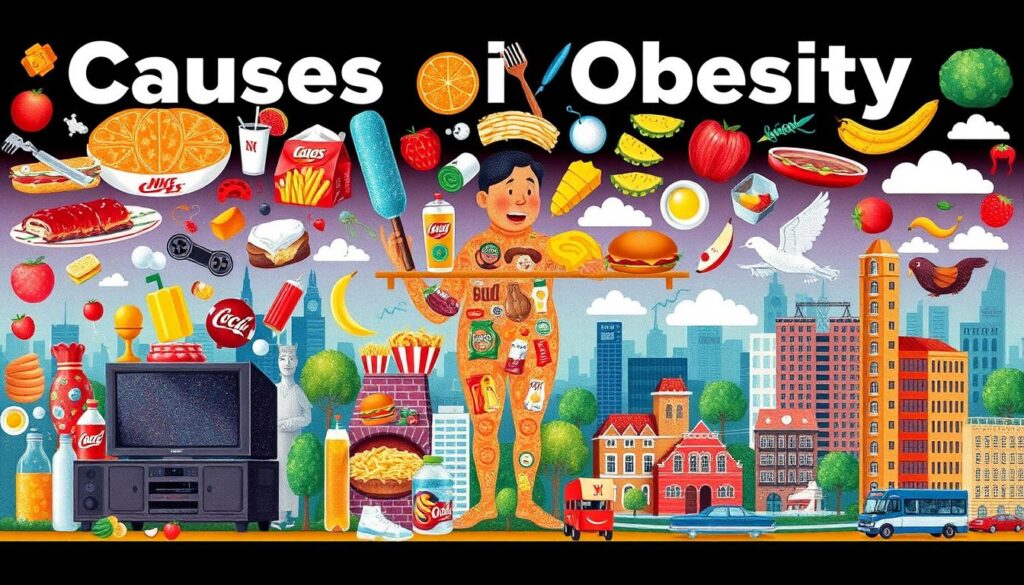Obesity and eating disorders are complex issues. They often mix together, causing physical, mental, and social problems. Obesity is seen as a weight problem, but research shows it might be linked to eating disorders too. It’s important to know what experts say about this connection.
Eating disorders affect 6.37% of Americans, costing $64.7 billion a year in healthcare. Weight-based discrimination is common, with 19% to 42% of adults facing stigma. Sadly, 63% to 74% of patients say their doctors have judged them because of their weight.
Weight bias can be very harmful. It can make getting diagnosed with an eating disorder take 9 months longer for those who were overweight or obese. This delay can badly affect a person’s health and well-being.
Key Takeaways
- Eating disorders affect 6.37% of Americans, costing $64.7 billion annually in healthcare expenses.
- Obesity is often stigmatized, with 19% to 42% of adults experiencing weight-based discrimination.
- Weight bias in healthcare can lead to delayed diagnoses and treatment of eating disorders in patients with higher BMIs.
- Overweight or obese individuals have a 2.45 times greater chance of engaging in disordered eating behaviors compared to those of normal weight.
- Understanding the complex relationship between obesity and eating disorders is crucial for effective treatment and prevention strategies.
Understanding the Connection Between Obesity and Eating Disorders
Obesity and eating disorders like binge eating disorder (BED) and compulsive overeating are closely linked. About 11 million people worldwide face eating disorders. Obesity rates have tripled since 1975, affecting many people. It’s important to understand how these conditions are connected for better health.
Defining Key Terms and Medical Classifications
Obesity is when your BMI is over 25. A BMI over 30 means you’re obese. Binge eating disorder is when you eat a lot of food and feel out of control. Many people with BED are also overweight or obese, showing a strong link between the two.
The Role of Mental Health in Weight Management
Mental health is key in managing weight. Psychological factors can greatly affect how we eat and see our bodies. Emotional eating is when we eat to feel better or to deal with bad feelings. It’s a big reason for both obesity and eating disorders. It’s vital to tackle mental health issues for lasting success.
Physical vs. Psychological Aspects
Obesity is mainly about having too much body fat. But, we can’t ignore the mental and emotional sides of weight management. Eating disorders like binge eating, compulsive overeating, and emotional eating can make us gain weight. On the other hand, the shame and social problems of obesity can lead to eating disorders. This makes the relationship between obesity and eating disorders very complex.
“Understanding the multifaceted nature of obesity and eating disorders is crucial for developing comprehensive and effective treatment approaches.”
The Complex Nature of Body Weight Regulation
Keeping a healthy weight management is hard. It involves many body and brain systems. The body’s weight control is a mix of homeostatic and hedonic systems.
The brain’s reward system affects how we eat. Food addiction and healthy lifestyle choices play big roles in this balance.
Many chemicals in our body help control weight. Knowing how these chemicals work is key to managing weight well.
| Key Factors in Body Weight Regulation | Prevalence and Trends |
|---|---|
|
|
It’s important to understand these complex factors. This knowledge helps in managing weight and living a healthy lifestyle. It’s especially helpful for those with food addiction and related problems.
Is Obesity an Eating Disorder: Medical Perspectives
Obesity affects over 66% of U.S. adults. But binge eating disorder (BED) only affects 1-3% of people. Yet, BED is linked to obesity and can lead to health problems like diabetes.
Clinical Diagnostic Criteria
BED is about losing control during binge eating. Obesity is about eating more calories than you burn. This shows they might need different treatments.
Research Evidence and Expert Opinions
People with both obesity and BED face more mental health issues. They might feel sad, have obsessive thoughts, and feel not good enough. They also do worse in treatment than those with just obesity.
Differences in Treatment Approaches
Both obesity and BED need a team effort for treatment. But, treating BED first with therapy is key. Then, focus on diet and lifestyle changes for weight.
“The etiology of BED is related to eating-related psychopathology, while obesity is primarily related to caloric imbalance.”
Binge Eating Disorder and Its Relationship to Obesity
Binge eating disorder (BED) is a complex issue. It’s often misunderstood and linked to obesity. While it can affect anyone, it’s more common in those who are overweight.
Studies show people with BED are 3-6 times more likely to be obese. BED is marked by eating a lot without control and feeling bad about it. It often starts with foods high in sugar, salt, and fat.
About 30% of those with BED were obese as kids. This shows a strong link between the disorder and being overweight.
The link between BED and obesity is complex. It involves both physical and mental factors. Brain studies show changes in how people with BED react to food and control their eating.
| Key Statistics | Figures |
|---|---|
| Prevalence of BED in the general population | 1-3% |
| Lifetime risk of BED for women vs. men | Higher in women |
| Typical age of onset for BED | 15.5-27.2 years old |
| Increased risk of obesity for individuals with BED | 3-6 times higher |
| Reported childhood obesity among those with BED | Around 30% |
Not everyone who is obese has BED. And not everyone with BED is overweight. It’s key to understand this complex relationship. This helps in finding the right treatment for both conditions.

Getting help, like therapy and support groups, is crucial. It helps break the binge eating cycle. It also helps develop a healthier relationship with food and body.
Neurobiological Differences Between BED and Obesity
Research is showing us how BED and obesity are different in the brain. Both affect how we eat, but they do it in different ways.
Brain Imaging Research Findings
Studies using brain scans have found interesting differences. People with BED have a special reaction in their brain when they see yummy food. This shows they really like food a lot.
Reward System Variations
Brain scans also show how BED and obesity affect rewards differently. People with BED get excited about food rewards more. But they don’t get as excited about other rewards.
Impulse Control Mechanisms
BED and obesity also differ in how they control impulses. BED seems to have a harder time controlling food urges. This might be because of how their brain works.
These brain differences are key for finding new treatments. Knowing how BED and obesity work differently can help us find better ways to help people.
| Characteristic | BED | Obesity |
|---|---|---|
| Prefrontal Cortex Activity | Heightened activity in the ventromedial prefrontal cortex and orbitofrontal cortex when exposed to food cues | Lower activity in prefrontal regions when exposed to food cues |
| Reward System Responsiveness | Stronger connectivity between the ventral striatum and other reward-processing regions, indicating heightened sensitivity to food-related rewards | Diminished response in the ventral striatum when anticipating non-food rewards, suggesting a more generalized impairment in reward processing |
| Impulse Control | Characterized by elevated impulsivity and compulsivity, potentially involving the mesocorticolimbic dopamine system | Less pronounced deficits in impulse control mechanisms |
These brain differences show we need to treat BED and obesity in different ways. Each condition has its own challenges.
The Impact of Weight Stigma in Healthcare
Weight stigma is a big problem in healthcare. It’s when people are treated badly because of their weight. Up to 74% of new doctors show weight bias, which can cause them to miss eating disorder diagnoses in heavier patients.
Patients who were once overweight or obese often get their eating disorder diagnosis late. This delay can be up to 9 months. Weight stigma can make people feel ashamed, lead to unhealthy behaviors, and even increase the risk of death.
Weight stigma in healthcare makes things worse for patients. It can hurt how well they talk to doctors, trust them, and follow treatment plans. People who are heavier in eating disorder treatment often face this stigma, which can make their eating problems worse.

How doctors talk to patients matters a lot. Using words like “obese” can hurt, but calling someone “a person with obesity” helps more. This shows how important kind words are in healthcare.
Fixing weight stigma in healthcare is key to better weight management, body image issues, and healthy lifestyles. Everyone in healthcare needs to work together. We must get rid of weight bias, treat everyone fairly, and make healthcare places where everyone feels welcome, no matter their size.
Gender Differences in Eating Disorders and Obesity
Eating disorders and obesity show different patterns in men and women. Research has found interesting facts about these issues in both genders.
Male-Specific Patterns
Eating disorders aren’t just for women. About one-third of cases of anorexia and bulimia are in men. Men with binge-eating often turn to drugs and worry a lot about their muscles.
Female Manifestations
Women face more cases of anorexia and binge-eating. There’s also a type of anorexia called atypical, where people have a higher BMI. This shows we need to see eating disorders in many ways, not just one.
Treatment Response Variations
Men and women react differently to treatment for eating disorders and obesity. Women tend to diet more, while men might not seek help because of shame. Knowing these differences helps us create better treatments for everyone.
| Characteristic | Women | Men |
|---|---|---|
| Prevalence of Anorexia Nervosa | Higher | Lower |
| Prevalence of Binge Eating Disorder | Higher | Lower |
| Substance Abuse in Binge Eating Disorder | Lower | Higher |
| Muscle Dysmorphia | Lower | Higher |
| Treatment-Seeking Behavior | More Likely | Less Likely |
Understanding the gender-specific patterns in eating disorders and obesity helps doctors give better care. This way, everyone gets the support they need, no matter their gender.
Treatment Options and Clinical Approaches
Managing binge eating disorder (BED) and obesity needs different treatments. This is because they have different brain effects. Medicines that help with both reward and control systems work well for BED.
These medicines help with impulsivity and compulsivity. Early treatment is key for BED and obesity. It helps stop the problem from getting worse.
A whole care plan is best. It looks at both body and mind health. Working with doctors to make a plan is important.
This plan should include a healthy lifestyle and weight control. It might also include special therapies. By focusing on the cause and supporting your health, you can live a better life.


A Life-Changing Experience with This Weight Loss Supplement (Nagano Tonic)
I’ve always struggled with finding a weight loss solution that actually works for me. Like many, I’ve tried numerous diets, exercise routines, and supplements over the years—some worked for a short time, but nothing ever gave me long-term results. That was until I decided to try the weight loss supplement I found : Link to the Supplement.
From the moment I started using it, I noticed a difference. Not only did I feel more energized, but my cravings also became more manageable. The best part? I started seeing results much quicker than I anticipated! Over the course of just a few weeks, I noticed a significant reduction in belly fat and overall weight loss that I hadn’t been able to achieve before.
What makes this supplement stand out from all the others I’ve tried is how it supports me in my daily routine without any jitters or energy crashes. I’m able to stay focused and motivated, which has made it easier to stay on track with my diet and exercise plan.
This product truly exceeded my expectations, and I feel more confident and healthier than ever before. If you’re struggling with your weight loss journey like I was, I highly recommend giving this supplement a try. It’s been a game-changer for me, and I’m sure it can work wonders for you too!
Contant Them on email .. tonicnagano50@gmail.com
I’ve tried so many weight loss products over the years, but nothing worked like this supplement! Since I started using it, I’ve noticed a big difference in my energy levels and appetite control. In just a few weeks, I’ve lost weight and feel so much better. It’s been easy to stick with, and the results speak for themselves. Highly recommend this to anyone looking to make a real change!
wasn’t sure what to expect, but this weight loss supplement has really impressed me! After just a few weeks of use, I’ve already dropped a few pounds and feel more motivated to stay active. It’s helped curb my cravings and boosted my energy throughout the day. I’m excited to keep going and see even better results. Definitely worth trying!
Reach them on tonicnagano50@gmail.com
I was skeptical at first, but this supplement has truly made a difference in my weight loss journey. I’ve lost weight without feeling deprived or sluggish. My cravings are under control, and I feel more confident in my body. It’s easy to incorporate into my daily routine, and the results speak for themselves. I’m so glad I gave it a try!
Thanks David, i do use the link to make my purchase. you can get too here http://surl.li/iasppy
This Nagano Tonic has been amazing! In just a few weeks, I’ve lost weight, feel more energized, and my cravings are under control. Highly recommend it!
Thats the link to purchase http://surl.li/iasppy